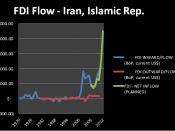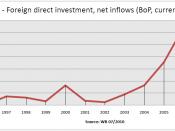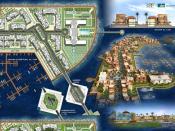"Globalisation has joined imperialism, colonialism, capitalism and communism in becoming an all purpose tag, which can be wielded like a club in almost any ideological direction. It is the defining political, economic and social phenomenon of the new millennium" Discuss.
The world is shrinking. Not physically, of course, but socially, culturally and economically. The nations of the world are coming closer together in terms of cultural contacts and economic transactions (Taylor, Richardson, Yeo, Marsh, Trobe, & Pilkington 1995). Globalisation can be interpreted differently by theorists. Anne Kruger (2000), deputy managing director of the International Monetary Fund, defines it as 'a phenomenon by which economic agents in any given part of the world are much more affected by events elsewhere in the world'. David Henderson (1999), former chief economist of the Organisation for Economic Co-operation and Development, defines globalisation as 'free movement of goods, services, labour and capital , thereby creating a single market in inputs and outputs; and full national treatment for foreign investors (and nationals working abroad) so that, economically speaking, there are no foreigners'.
This defines globalisation but how does it compare to imperialism, colonialism, capitalism and communism?
Imperialism is a policy of extending control or authority over foreign entities as a means of acquisition and/or maintenance of empires, either through direct territorial conquest or through indirect methods of exerting control on the politics and/or economy of other countries. Colonialism refers to the extension of a nation's sovereignty over territory and people outside its own boundaries, often to facilitate economic domination over their resources, labour, and markets. Capitalism has been defined in various ways. In common usage, it means an economic system in which the means of production are overwhelmingly privately owned and operated for profit, decisions regarding investment of capital are made privately, and where production, distribution,


